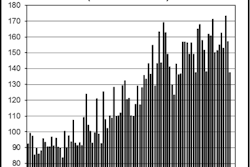
President Donald Trump promised during the presidential campaign and after his election to lead an upgrade in our nation's infrastructure, announcing in February 2017, for instance, that he would ask Congress to approve programs designed to stimulate $1 trillion in infrastructure investment across the country.
At least up to this point, the President's promises with respect to infrastructure remain unfulfilled. Furthermore, the recently passed tax bill that he signed last week may create some challenges for the municipal bond market and the infrastructure sector.
The facts
- Bridges, schools, police stations, sewer systems, levees and airports, as well as other forms of infrastructure, are essential for economic activity in America and elsewhere. But public investment in the United States has fallen sharply since the 1980s, and with this declining investment our infrastructure has aged and deteriorated in important ways (see here). The American Society of Civil Engineers recently gave U.S. infrastructure a grade of D+, and estimated that it would take $3.6 trillion in spending to bring our infrastructure to a state of "good repair."
- The municipal bond market has been an important source of financing for infrastructure investment (see this Econofact memo). Proceeds from bond issuance paid for about 32 percent of infrastructure investment in 2015, with the rest of the funding for infrastructure coming directly from a mix of sources that includes the federal government, state and local governments, and dedicated fees. The recently passed tax bill will pose some immediate challenges for the municipal bond market and for issuers of municipal bonds, and also raises the potential for longer-term challenges. In general, the demand for municipal bonds is partly driven by the tax-exemption of their interest, which means that issuers of municipal bonds can pay lower yields than can issuers of otherwise equivalent taxable bonds. The tax-exempt status of municipal bonds has been preserved in the new tax legislation. But the fact that marginal tax rates have fallen both for individuals and especially for corporations will mean that the relative yield on municipal bonds will have to rise in order for the bonds to remain competitive as an investment choice, making financing more expensive for infrastructure projects
One direct effect of the tax legislation on the municipal market is the elimination of the tax deduction for "advance refunding" municipal bonds.
Many municipal bonds are "callable" – a "call" provision means that the issuer of a bond can purchase the bond back from investors before the bond's maturity at a pre-specified price. For example, a bond may have a 30-year maturity but be callable after 10 years, meaning that the issuer would have the right to buy the bond back and retire it after 10 years. This provision allows issuers to take advantage of falling interest rate levels. Current tax rules allow a municipal issuer to "advance refund" (one time) an issue that is not yet callable. The loss of the advance refunding provision raises the potential cost of issuing municipal bonds by limiting the ability to refinance debt in response to decreasing interest rates. Veteran municipal analyst George Friedlander of the Court Street Group has recently suggested that with the new limits on advance refunding, issuers and underwriters will have an incentive to develop more costly, exotic and opaque structures involving derivatives that accomplish the same objective while complying with the new law (see this article in The Bond Buyer). But even with these potential responses to the new tax legislation, the new limitations on advance refunding will, on net, raise the cost of tax-exempt financing for infrastructure projects.- The deliberations regarding the tax bill raised uncertainty regarding the tax-exempt status of Private Activity Bonds (PABs) going into the future. PABs are tax-exempt bonds issued to finance the construction of private-sector facilities that have a significant public purpose. The PAB market is a particularly important tool for financing low-income housing. The House version of the tax bill proposed total elimination of PABs, and even though PABs have survived in the new tax law signed by President Trump, there have already been signals from Congressional Republicans that the question of tax exemption for PABs may be revisited very soon. The total Private Activity Bond issuance volume was over $35 billion in 2016, a bit less than 10 percent of the total municipal market, so the loss of this financing channel would be an important change in the overall market and a particular shock to important subsectors of the market such as housing.
Read more from CBS News.

















![Fcp Racatac Chair 10893876[1]](https://img.forconstructionpros.com/mindful/acbm/workspaces/default/uploads/2025/10/fcp-racatac-chair-108938761.10l0At5WXv.png?ar=16%3A9&auto=format%2Ccompress&bg=fff&fill-color=fff&fit=fill&h=135&q=70&w=240)
